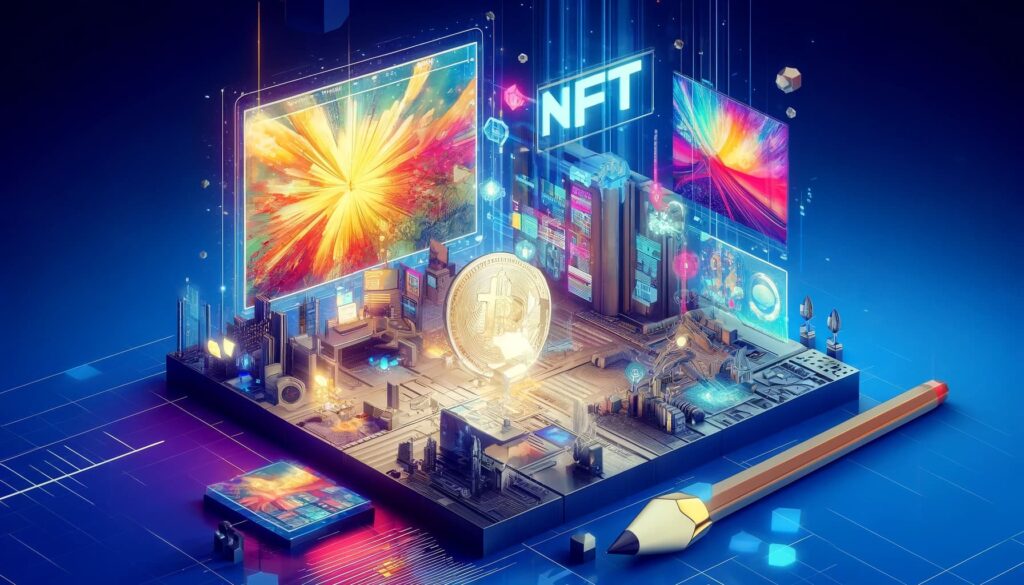Smart Contract Platforms
Smart contract platforms are decentralized digital frameworks that enable the creation and execution of smart contracts, allowing for automated and trustless transactions. In 2024, some of the top smart contract platforms include Ethereum, Binance Smart Chain, Cardano, Solana, Polkadot, Avalanche, and Tezos, each offering unique strengths and features. These platforms support the deployment of decentralized applications (dApps) and provide a foundation for enterprise blockchain implementations, with notable mentions like Hyperledger Fabric and R3 Corda being particularly suited for enterprise use cases.
Definition of smart contracts
Smart contracts have emerged as a game-changing technology in recent years, revolutionizing the way transactions are conducted and executed. As a self-executing contract with the terms of the agreement directly written into code, smart contracts aim to automate and facilitate the exchange of assets between parties without intermediaries. These contracts are based on blockchain technology, ensuring transparency, security, and immutability.

Unlike traditional contracts that often require the involvement of trusted third parties, smart contracts eliminate the need for intermediaries by automatically enforcing the agreed-upon conditions once the predetermined criteria are met. By streamlining processes and reducing costs, smart contracts hold the potential to transform industries and facilitate new forms of digital interactions and collaborations. Their programmable nature enables a wide range of applications, including financial transactions, supply chain management, voting systems, and more.
In this increasingly digitized world, smart contracts offer immense opportunities, promoting efficiency, trust, and decentralization in various sectors.
Importance of smart contract platforms in blockchain technology
Smart contract platforms play a crucial role in the advancement of blockchain technology. They provide the ability to create and execute programmable agreements, called smart contracts, on the blockchain. These platforms, such as Ethereum, have revolutionized industries like decentralized finance (DeFi) and supply chain management.
One of the key benefits of smart contract platforms is their ability to automate processes and eliminate the need for intermediaries. Traditional agreements often involve multiple parties and middlemen, leading to delays, increased costs, and a lack of transparency. Smart contracts, on the other hand, allow for the automatic execution of agreements, ensuring that conditions are met before any transaction takes place. This streamlined process not only saves time and money but also reduces the risk of fraud or errors.
In industries like DeFi, smart contract platforms have enabled the creation of decentralized applications (dApps) that offer financial services without relying on traditional intermediaries like banks. These platforms allow for the development of decentralized lending, borrowing, and trading protocols, providing greater accessibility and inclusivity.
Similarly, in supply chain management, smart contracts enable the tracking and verification of products from origin to destination. By recording every step on the blockchain, stakeholders can have an accurate and transparent view of the entire supply chain. This not only reduces the risk of counterfeiting but also helps improve efficiency and trust among the participants.
Smart contract platforms are of utmost importance in the blockchain technology ecosystem. They provide essential tools for creating automated agreements, revolutionizing industries like DeFi and supply chain management. With streamlined processes, reduced intermediaries, and increased transparency and security, smart contracts are poised to reshape various sectors in the future.
Key Features of Smart Contract Platforms
Smart Contract Platforms are revolutionary blockchain technologies that aim to automate and secure transactions without relying on intermediaries. By utilizing self-executing contracts with predefined rules, these platforms eliminate the need for trusted third parties and empower individuals to conduct business in a more efficient and transparent manner. In this article, we will explore the key features of smart contract platforms that make them an attractive option for various industries, including finance, supply chain, real estate, and more.
Security features
The Waves blockchain platform boasts a robust set of security features that ensure the integrity and safety of user transactions and data. This is achieved through a combination of security protocols, encryption methods, and smart contract logic.
Security protocols on the Waves platform involve a range of measures to protect against potential threats, such as distributed denial of service (DDoS) attacks and unauthorized access attempts. These protocols include network monitoring, firewalls, and intrusion detection systems, which work collectively to prevent and defend against any potential breaches.
Encryption methods are crucial for securing data on the Waves blockchain. The platform utilizes advanced encryption algorithms to encrypt and decrypt sensitive information, ensuring that it remains confidential and tamper-proof. This encryption helps protect user identities, transaction details, and any other data stored on the blockchain.
Smart contract logic is another crucial aspect of security on the Waves platform. The platform's smart contracts are designed with carefully crafted code to prevent vulnerabilities and ensure that only authorized operations can be executed. These smart contracts undergo rigorous testing to ensure their reliability and resiliency against potential attacks.
To evaluate fraud-tolerance and reinforce the system, the Waves platform employs a comprehensive stress-testing process. This process involves subjecting the system to simulated high-volume transactions, intense network traffic, and other adverse conditions to test its resilience. By doing so, any weaknesses or vulnerabilities can be identified and addressed, making the system more robust and less susceptible to fraudulent activities.
The security features on the Waves blockchain platform are comprehensive and include security protocols, encryption methods, and smart contract logic to protect against threats and ensure the safety of user transactions and data. The stress-testing process further strengthens the system's fraud-tolerance by identifying and rectifying any potential weaknesses.
Scalability
Scalability is a crucial consideration for blockchain solutions as they strive to handle a high volume of transactions per second (TPS). Various approaches have been adopted to address scalability concerns.
One such solution is Binance Smart Chain (BSC), which achieves scalability through its consensus mechanism called Proof of Staked Authority (PoSA). BSC utilizes a relatively small number of validators who are trusted entities with a stake in the network. By limiting the number of validators, BSC can achieve faster transaction finality and higher TPS compared to other decentralized blockchain platforms.
IBM has chosen Stellar for its World Wire payments network to address scalability in the context of a global marketplace. Stellar utilizes a unique consensus protocol called the Stellar Consensus Protocol (SCP), which enables rapid transaction settlement and scalability. SCP facilitates fast confirmation times and parallelized processing, ensuring high TPS amidst a large number of participants in the network. This makes Stellar well-suited for IBM's needs to support real-time cross-border payments on a global scale.
On the other hand, Ethereum, the second-largest blockchain platform, has faced scalability limitations. Its current consensus mechanism, Proof of Work (PoW), has led to congestion and high fees during periods of peak demand. To overcome this, Ethereum is actively exploring Layer 2 (L2) scaling solutions. These solutions operate on top of the base Ethereum chain and aim to achieve high-TPS by processing transactions off-chain or in a more scalable manner. Examples of L2 solutions include state channels, sidechains, and Rollups.
Scalability is a critical aspect of blockchain solutions, and different approaches are being employed to address high TPS requirements. Binance Smart Chain utilizes PoSA, IBM utilizes Stellar's SCP, and Ethereum is exploring high-TPS L2 solutions to overcome its scalability limitations and ensure efficient operation in a global marketplace.
Interoperability
Polkadot's interoperability feature revolutionizes the smart contract landscape by enabling seamless connectivity and information sharing between different blockchains. The ability to connect and communicate across various blockchain networks enhances scalability, security, and overall functionality in the blockchain ecosystem.
First and foremost, Polkadot's interoperability feature solves the scalability challenge by allowing transactions to be processed in parallel across multiple blockchains. This means that the overall capacity and throughput of the system are greatly improved, providing a scalable solution for smart contracts. Additionally, by enabling communication between blockchains, Polkadot enables developers to leverage the strengths of different networks, such as privacy-focused blockchains or networks optimized for specific use cases, to enhance the functionality and efficiency of smart contracts.
Furthermore, the feature enhances security by enabling the sharing of information and resources between blockchains. This means that smart contracts can access and utilize data from other blockchains to make more informed decisions and execute more complex functionalities. Additionally, the shared security model of Polkadot ensures that security measures implemented by one blockchain can benefit other connected blockchains, making the entire ecosystem more robust against potential security threats.
Polkadot's interoperability feature significantly improves the functionality of smart contracts by providing connectivity and information sharing between different blockchains. This enhances scalability, security, and overall efficiency in the blockchain ecosystem, opening up new possibilities for developers and businesses alike.
Flexibility
Flexibility plays a crucial role in maintaining joint health, preventing injuries, and enhancing overall physical performance. Incorporating stretching exercises, yoga, Pilates, and regular physical activity into one's routine can greatly improve flexibility.
Stretching exercises are a simple yet effective way to increase flexibility. By systematically elongating the muscles and tendons, stretching helps improve range of motion and joint mobility. Static stretching, where a muscle is stretched and held for a period of time, and dynamic stretching, involving active movements that dynamically stretch the muscles, are both beneficial in increasing flexibility.
Yoga is another excellent practice for improving flexibility. Its combination of stretching, strength-building, and balancing exercises promotes both physical and mental well-being. The various poses and movements in yoga gently stretch the muscles, ligaments, and tendons, increasing flexibility and improving joint health.
Similarly, Pilates focuses on core strength, muscle control, and flexibility. It emphasizes the coordination of breathing with precise movements, and through controlled stretching, it strengthens and lengthens the muscles.
Maintaining flexibility through these exercises is essential for joint health. Flexibility allows joints to move freely and efficiently, reducing the risk of joint pain, stiffness, and degenerative conditions like arthritis. Additionally, flexible muscles are less prone to injuries, as they have an increased range of motion and can better absorb impact during physical activities.
Lastly, flexibility contributes to overall physical performance. It enhances athletic performance by facilitating movements such as running, jumping, and reaching, and improves balance, coordination, and posture.
Incorporating stretching exercises, yoga, Pilates, and regular physical activity into one's routine are effective ways to enhance flexibility. Flexibility is crucial for maintaining joint health, preventing injuries, and improving overall physical performance. Prioritizing flexibility through these practices ensures better physical well-being and a reduced risk of musculoskeletal issues.
Popular Smart Contract Platforms
Smart contracts have revolutionized numerous industries by automating and digitizing contractual agreements. These contracts operate on blockchain technology, providing transparency, security, and trust in transactions. As the popularity of smart contracts continues to grow, various platforms have emerged to facilitate their development and implementation. These platforms offer unique features and capabilities, attracting developers and businesses seeking efficient and reliable smart contract solutions. In the following sections, we will explore some of the popular smart contract platforms and delve into their distinct offerings and advantages.
Ethereum
Ethereum is a groundbreaking blockchain-based platform that has revolutionized the world of smart contracts. As the first blockchain platform to allow for the deployment of smart contracts, Ethereum has had a significant impact on various industries and has become the go-to choice for developers and businesses seeking to create decentralized applications.
One of the key reasons behind Ethereum's success and widespread adoption is its support for the Solidity language. Solidity is a programming language designed specifically for writing smart contracts on the Ethereum platform. This language enables developers to create complex, automated agreements that can enforce themselves without the need for intermediaries.
Moreover, Ethereum's dominance in the decentralized finance (DeFi) space cannot be ignored. With a plethora of decentralized finance applications built on top of its platform, Ethereum has become the backbone of the DeFi ecosystem. This has created a massive surge in innovation, allowing for the creation of decentralized lending platforms, decentralized exchanges, stablecoins, and more.
Another crucial aspect of Ethereum is its interoperability. The platform allows for the creation and integration of various tokens and decentralized applications (dApps) on its blockchain. This interoperability enables seamless interaction between different services and applications, promoting greater efficiency and usability.
Furthermore, Ethereum has continuously made advancements in security measures. Over the years, the platform has addressed vulnerabilities and improved security protocols to safeguard user funds and ensure the integrity of smart contracts. These continuous security improvements have bolstered confidence in Ethereum as a reliable and secure smart contract platform.
Ethereum's significance as a smart contract platform is undeniable. With its support for the Solidity language, dominance in the DeFi space, interoperability with tokens and dApps, and continuous improvements in security measures, Ethereum has cemented its position as the leading platform for building decentralized applications and executing smart contracts.


